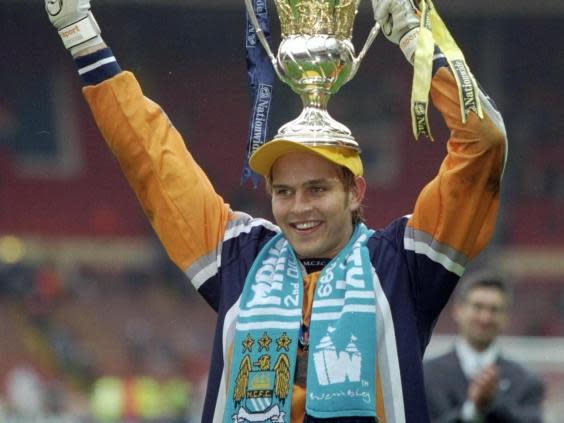Manchester City hero Nicky Weaver on linesman chat before Gillingham '99 playoff heroics
Nicky Weaver admits maths was never his strong point. “I was stood next to the linesman and I said: ‘If I save this, is that it?’ He said yes. I said: ‘Are you sure?’ and he said yes.” Weaver had to be sure. Because when he dived to his left, pushing Guy Butters’ penalty away with both hands, it was time to get silly.
“I waved the lads over and sort of pulled a face,” the former Manchester City goalkeeper recalled. “I don’t know where that came from. I’ve never seen it before or after! As the lads got closer I hopped over the advertising boards, round the gravel track, as you could at Wembley then, back over the other side and onto the pitch. I didn’t know what I was doing to be honest!”
Weaver carried on running, windmilling his arms in the air, until he was finally floored by Andy Morrison. “The last thing I wanted was 20 grown men piling on top of me, but that’s what happened.” It remains one of the most memorable celebrations ever seen at Wembley and a perfect portrait of the lunacy that is the Football League play-off finals weekend.
Next week, City will mark the 20th anniversary of rising from their lowest ebb and the ecstasy of beating Gillingham 3-1 on penalties after a 2-2 draw in the 1999 Division Two play-off final. But as Weaver and his old team-mates are well aware, their day was within seconds of ending in agony.
In arguably the greatest play-off final since their introduction in 1987, Gillingham took the lead in the 81st minute through Carl Asaba. When Robert Taylor doubled their advantage, City appeared destined to spend a second year in third-tier obscurity. “Even at 1-0 down I was thinking: ‘What a chance and we’ve thrown it away’,” Weaver said. “When the second one went in I just thought we’d thrown it away, ‘typical City’.”
A 90th-minute Kevin Horlock goal and five minutes of added-on time gave City hope. And incredibly, in the last of those five minutes, Paul Dickov struck past Gillingham goalkeeper Vince Bartram, who had been the best man at Dickov’s wedding. There had been four goals in a quarter-of-an-hour, but there would be none in extra time.
Instead, Weaver faced his first ever penalty shoot-out. “I don’t think I’d even been in one in a school tournament,” he remembered. “Nowadays you look at where the last few penalties have been, you all the information, statistics. There was none of that then. I just thought: ‘Make yourself look as big as you can, pick a way and go that way’.
Being the big fish in the old Division Two had not necessarily helped City that season. They were “everybody’s cup final”, in Weaver’s words. A defeat at York before Christmas left City in mid-table. Complacency was a problem. “I think everyone thought it was going to be a lot easier than it was,” he admitted.

And yet, Weaver believes that stature helped when it came to actual cup final. “I think the big thing for the shoot-out was that it was at the City end, and for the Gillingham players who weren’t big time players, they were just League One players, it would have been real pressure. It was pressure for everybody but I suddenly must have looked a bit bigger and the goal a bit smaller.”
Weaver saved the first, kicking Paul Smith’s attempt away. “You fancy yourself to save at least one out of five, I would say, and I think the fact I save the first one puts you on a front foot going into the rest of the penalties.” Adrian Pennock shanked Gillingham’s next kick well wide. John Hodge scored their third, but then up stepped Butters and away, over the advertising hoardings and onto that old gravel track, went Weaver.
Derby County and Aston Villa, Sunderland and Charlton Athletic, Newport County and Tranmere Rovers: they all might have similar to look forward to this weekend. For the modern-day City meanwhile, that day at Wembley is a fond but distant memory. The Division Two play-offs could seem a little small fry, in retrospect, after a week spent celebrating a domestic treble.
Weaver, though, sees a distinct path between the past and the present. “We had to go up and we went up, and we went up the next year as well. So, within a year of that game we were in the Premier League, and that suddenly becomes a lot more attractive to move into a new stadium that’s being built for the Commonwealth Games.
“If we hadn’t done it who knows what would have happened? Nobody knows but it certainly wouldn’t have been any easier. The stadium followed a few years later, and then obviously the big investment came few years after that. If the stadium hadn’t come, the investment might not have come and we might not have been sat here.”
The transformative potential of the play-offs is plain to see. And few City supporters that Weaver meets have forgotten his part on the road to success. “Even from 10 years ago, more people ask me now [about it] than ever before,” he said. “Someone said to me after the game I’d be dining on that for 20 years, and I thought: ‘Yeah right’. But here we are 20 years later still talking about it.”

 Yahoo News
Yahoo News 
